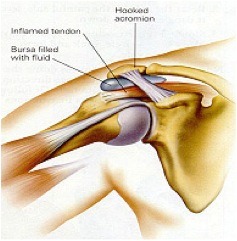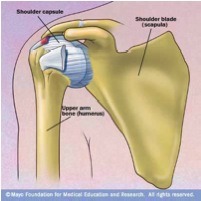The problem:
- The ball-and-socket joint of the shoulder is contained within a connective tissue capsule made up of the tendons of the rotator cuff muscles.
- For reasons that have not yet been clearly defined, this capsule can sometimes become inflamed and tighten, ultimately restricting range of movement in the shoulder
- This condition is commonly known as frozen shoulder, but may also be called adhesive capsulitis
Interesting facts:
- Frozen shoulder can occur following long periods of immobilization which is common after surgery and serious injury

- Frozen shoulder is more likely to develop in individuals over the age of 40
- 70% of cases occur in women
- People with diabetes are at an increased risk of developing frozen shoulder
What you can expect/look out for:
- Frozen shoulder typically progresses through three stages over the course of 18-24 months
- The first stage is known as the “Freezing” or “Painful” stage. During this stage, shoulder movements become painful and range of movement is limited. Often pain occurs at night and may affect your sleep.
- The second stage is known as the “Frozen” stage. At this time, pain may become less of a problem, but range of movement is significantly reduced.
- The final stage is known as the “Thawing” stage. Throughout this stage, shoulder range of movement gradually improves
Hints for self management:
- Anti-inflammatory medication may help with pain management
- Continue to use the available range of movement in the affected shoulder as much as possible without causing too much pain
Management options:
- Corticosteroid injection – for some individuals this can reduce pain symptoms and potentially shorten the first stage of
 freezing
freezing - Physiotherapy can provide guided stretches and exercises to maintain as much range of movement as possible.
- Interventions to restore strength and range of movement are most effective in the thawing stage
More information:
- Frozen shoulder is usually a self-limiting condition and symptoms improve over time
- For most individuals, near normal range of movement and strength can be restored
- Occasionally surgery or hydrodilatation is required to help release the tightened capsule.
At Sydney Physiotherapy Solutions our highly qualified physiotherapists specialise in the assessment, treatment and prevention of neuromusculoskeletal injuries.
Contact us today – 9252 5770
This handout was prepared by Sydney Physiotherapy Solutions and is intended as a general information service. Please note that the information provided is not intended as a substitute for advice from a registered physician or healthcare professional. If symptoms persist, please consult your doctor.

